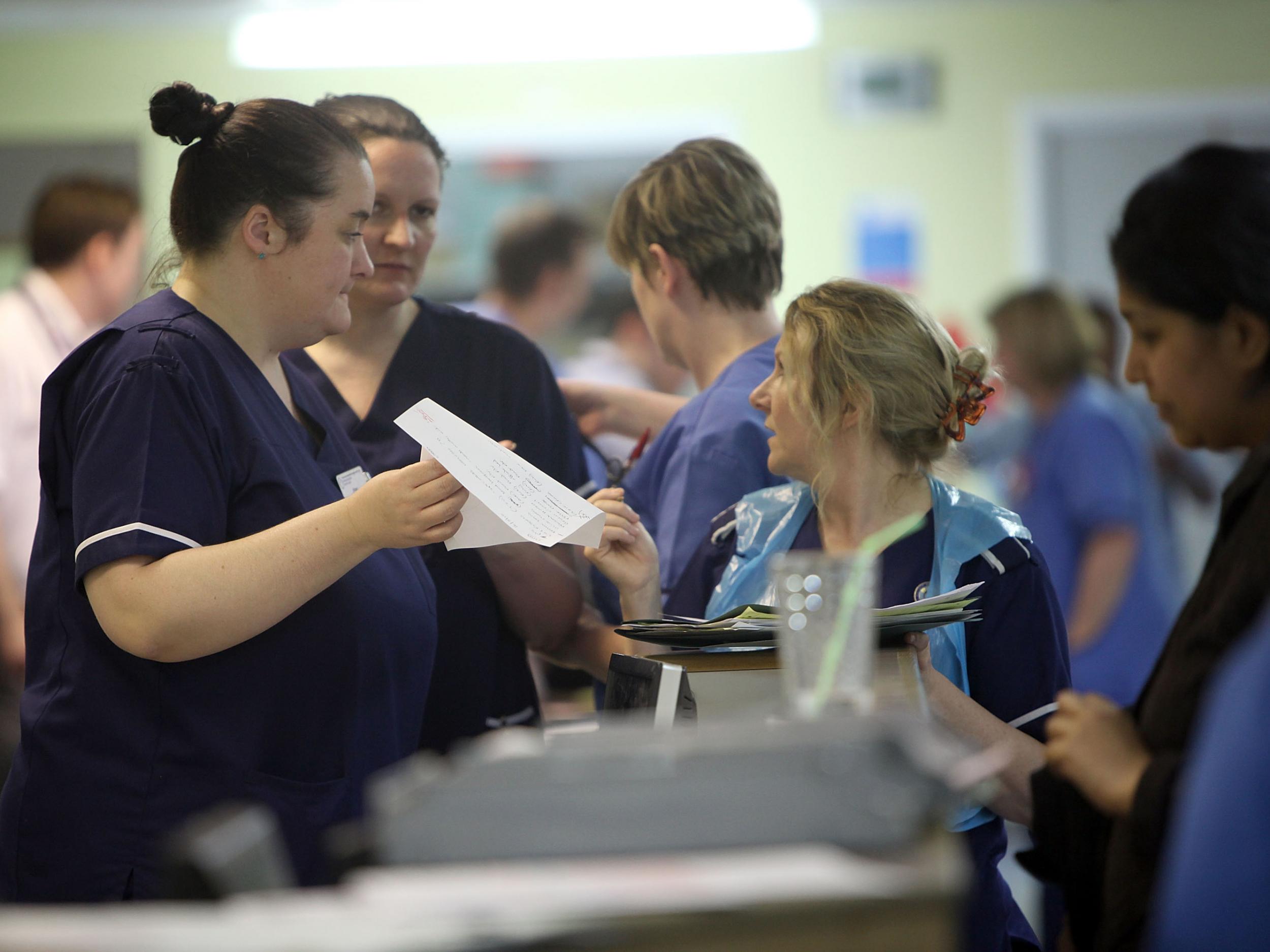Labour warns of NHS 'disaster' as 100,000 jobs across organisation lie empty
Nursing leaders warn of pressures on the health service amid increased demand, tightening budgets and poor working conditions

Theresa May has been warned over a deepening crisis in the health service as new figures show more than 100,000 NHS posts are lying vacant.
New analysis suggests the number of unfilled doctor positions has risen beyond 10,000 for the first time, while vacancies for nurses soared to 40,000 within the health service in England.
Nursing leaders warned the health service is now facing intense pressures amid increased demand, tightening budgets and poor working conditions that across the NHS has led to almost one in 10 posts remaining unfilled.
In a sign of the challenges facing the health service, The Independent revealed last week that one in five hospital trusts ran out of spare beds in the first weeks of winter, with seasonal pressures just beginning to bite.
It also comes after Health Education England – the NHS staffing agency – recently identified a need for 190,000 extra staff by 2027 as part of a draft strategy to provide a sustainable workforce.
The new figures were uncovered by Labour through a series of freedom of information requests to more than 80 NHS trusts.
Shadow Health Secretary Jonathan Ashworth said: “Tory mismanagement of the workforce has been a disaster for staff and patients alike.”
Ministers were urged to take immediate steps to guarantee patient safety as the figures revealed overall vacancy rates rose to 9 per cent this year, with hospitals short of thousands of vital staff, including some 40,000 nurses and 11,000 scientific, technical and therapeutic staff.
Nearly one in 10 hospital and community doctor posts remain unfilled, while the highest vacancy rates were among nurses at 12.2 per cent, leaving some hospitals and care homes reliant on inexperienced healthcare assistants.
Labour accused the Government of presiding over a workforce crisis of its own making, pointing to the controversial public sector pay cap and the decision to scrap bursaries as key factors behind the difficulty recruiting frontline staff.
Mr Ashworth said: “For years the Government has failed to ensure enough new recruits coming through in key specialities, while failed policy decisions like the NHS pay cap and the ending of the NHS bursary have contributed to a growing crisis.”

Staffing shortages already divert funding from front-line services, as hospital bosses have been forced to spend £3bn a year on costly agency staff to plug the gaps on wards, he said.
Mr Ashworth added: “There is now an urgent need for a sustainable, fully funded plan to get the right numbers of staff in place to keep patients safe.
“Labour’s research today has shown that NHS workforce shortages in key areas are continuing to get worse year on year – ministers must take action before it’s too late.”
Vacancies were particularly high among mental health trusts, with South London and Maudsley NHS Foundation Trust reporting a 23 per cent vacancy rate and North Essex Partnership University NHS Foundation Trust, which had a 22 per cent rate.
A spokesperson for South London and Maudsley NHS Foundation Trust said it takes safe staffing levels “very seriously” and has managed to reduce vacancy rates to 14 per cent since March.
They said: “This is still too high, and work continues to reduce it, though it should be noted that vacant clinical roles are almost without exception filled by temporary, many of whom work with us regularly on flexible contracts. The Trust does not seek to save money by holding posts open, to the detriment of the care we provide.”
Campaigners said staffing shortages were already impacting on patient safety and care standards, with warnings of a “perilous January” if staffing levels remain low.
Rachel Power, chief executive of the Patients Association, told The Independent: “Workforce shortages can have, and are having, serious consequences for patients’ experience of NHS care, and for their safety.
“They lead to longer waits for treatment, and increased difficulty in securing appointments.
“For in-patients, we know there are particular risks associated with an overstretched workforce struggling to provide care to a decent standard, and more liable to making mistakes – despite the often mighty efforts of the workers concerned.
“The big danger now must be that the situation could spiral: the more gruelling things get, the more clinicians and professionals will feel they can’t face it any longer and decide to leave, and the greater the risks to patients.”
Janet Davies, head of the Royal College of Nursing, said the NHS was “haemorrhaging experienced nurses” despite soaring demand, and called on the Government to enshrine safe staffing in law.
She said: “Despite ministers’ rhetoric on the importance of safety, it will enter a perilous January without enough staff to give safe care.
“Nurses are spread too thinly and starting to blow the whistle on falling standards. Hospital wards and care homes alike increasingly rely on unregistered healthcare assistants, especially at night.
“The Government must no longer allow nursing on the cheap – patients, particularly vulnerable and older individuals, can pay the highest price.”
Chancellor Philip Hammond announced a £355m winter boost for the health service in last month’s Budget, but the offer falls far short of NHS England boss Simon Stevens’s demand for £350m a week promised by the Leave campaign.
In a highly unusual intervention, Mr Stevens demanded the NHS receive the sum promised by Brexiteers during the referendum campaign – a pledge that has since been widely discredited.
A Department of Health spokesperson said: “The truth is that latest NHS Digital figures show there are over 32,300 more professionally qualified clinical staff working in the NHS since 2010 and we are increasing training places for doctors and nurses by 25 per cent.”
Join our commenting forum
Join thought-provoking conversations, follow other Independent readers and see their replies
Comments
Bookmark popover
Removed from bookmarks